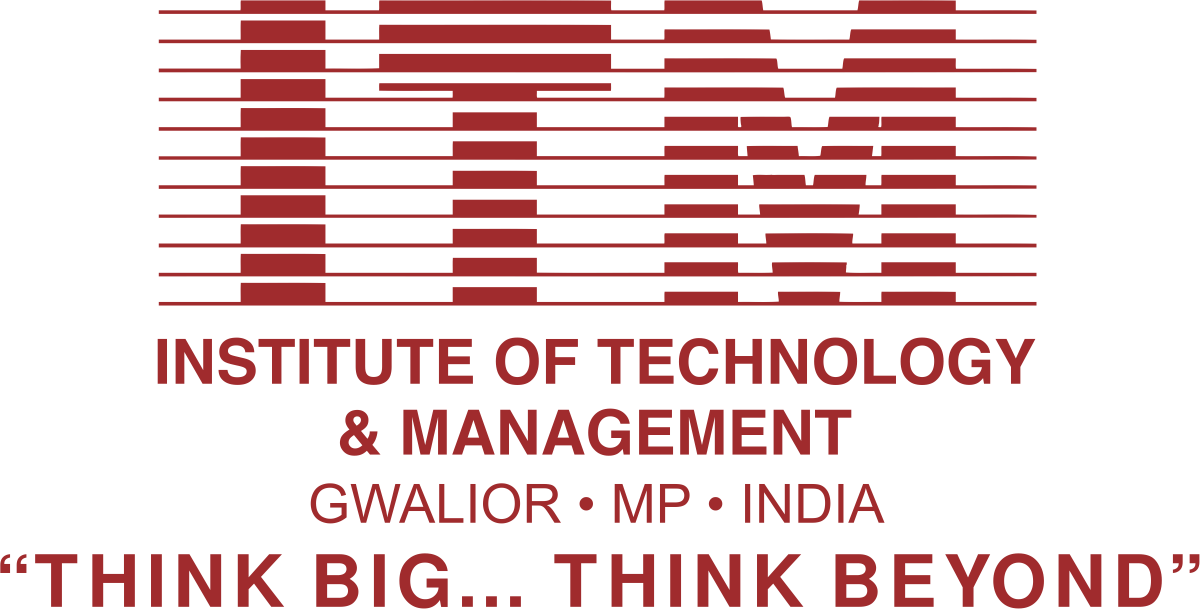About Department
The Department of Information Technology at the Institute of Technology & Management is dedicated to nurturing professionals with the technical expertise required to drive automation in production processes and address the demands of the modern digital world. Our curriculum is thoughtfully crafted to integrate in-depth theoretical knowledge with hands-on practical applications, enabling students to excel in diverse domains of information technology and IT-enabled sectors.
Our department boasts advanced laboratories equipped with essential application software, compilers, and hardware. The infrastructure is designed for modern learning, featuring hybrid configurations with high-speed internet and Wi-Fi connectivity across 565 terminals to facilitate seamless and effective education.
By offering students experiential learning opportunities with state-of-the-art technologies and platforms, we ensure they develop proficiency across both software and hardware environments. Our mission is to empower students with the knowledge, skills, and tools they need to thrive in the fast-evolving and highly competitive field of Information Technology.
Vision of the Department
The Department of Information Technology envisions preparing technically competent problem solvers, researchers, innovators, entrepreneurs, and skilled IT professionals for the development of rural and backward areas of the country for the modern computing challenges.
Mission of the Department
- To offer valuable education through an effective pedagogical teaching-learning process.
- To shape technologically strong students for industry, research & higher studies.
- To stimulate the young brain entrenched with ethical values and professional behaviors for the progress of society.
Program Educational Objectives Statements
- Our graduates will show management skills and teamwork to attain employers’ objectives in their careers.
- Our graduates will explore the opportunities to succeed in research and/or higher studies.
- Our graduates will apply technical knowledge of information technology for innovation and entrepreneurship.
- Our graduates will evolve ethical and professional practices for the betterment of society.
Program Specific Outcomes
- The ability to understand the principles of computer software to analyze, design, and develop algorithms for complex and logical problems.
- Enhance programming concepts and professional competencies of students by exercising principles of software engineering to fix various computational problems.
- To implement emerging technologies such as Natural Language Processing, Quantum Computing, Parallel Processing &Cloud Computing, etc., to serve society.
HoD Desk

Dear Students and Future Technologists,
It is with immense pride that I welcome you to the Department of Information Technology at the Institute of Technology & Management. Our department serves as a hub of cutting-edge technological innovation, dedicated to advancing the frontiers of knowledge and technology. We aim to inspire, educate, and empower the next generation of IT leaders who will shape industries and create meaningful societal impact.
Equipped with state-of-the-art laboratories and advanced infrastructure, our department provides a hands-on learning environment aligned with emerging technologies and industry trends. These modern facilities prepare you to tackle the dynamic challenges of the ever-evolving IT landscape.
Our adoption of an Outcome-Based Education (OBE) approach ensures that our students graduate with a comprehensive skill set. This philosophy emphasizes not only technical expertise but also ethical responsibility and global competence, ensuring you are well-prepared for professional success.
We are privileged to have a team of highly qualified faculty members, many of whom are alumni of premier institutes across India. Their passion for teaching and research is focused on enhancing your employability and nurturing your potential as future IT professionals. Your growth and achievements are a reflection of our commitment, and we are here to guide and support you at every step.
We are confident that your journey through our department will be both transformative and enriching, equipping you to excel in a global arena and to embrace challenges with confidence and capability. Together, let us build a future of innovation, responsibility, and excellence.
Wishing you a successful and rewarding academic journey!
Dr. Aditya Vidyarthi
Professor and Head
Department of Information Technology
+91 9300144689
hodit@itmgoi.in
Programmes Offered
Bachelor of Technology (B.Tech) in Information Technology
(04 Year Degree Program)
List of Faculty Members for Information Technology
| S.No. | Name of the Faculty | Designation | Date of Joining | Nature of Association | Area of Specialization | Qualification |
|---|---|---|---|---|---|---|
| 1 | Dr. ADITYA VIDYARTHI | PROFESSOR | 11/8/2021 | Regular | Operating System, DBMS | M.Tech, Ph.D. (CSE) |
| 2 | Dr. JITENDRA SINGH KUSHWAH | ASSOCIATE PROFESSOR | 10/7/2009 | Regular | Data Structure, Data Analysis, Analysis & Design of Algorithm | M.Tech, Ph.D. (CSE) |
| 3 | Mr. DESHDEEPAK SHRIVASTAVA | ASSISTANT PROFESSOR | 21/8/2007 | Regular | Data Structure, OOPM, Analysis & Design of Algorithm | M.Tech, Ph.D (CSE)-Pursuing |
| 4 | Mr. MADHUKAR DUBEY | ASSISTANT PROFESSOR | 21/03/2022 | Regular | Theory of Computation, JAVA | M.Tech, Ph.D (CSE)-Pursuing |
| 5 | Ms. APOORVA DESHPANDE | ASSISTANT PROFESSOR | 26/02/2024 | Regular | Cyber Security, OOPM | M.Tech |
| 6 | Ms. SHRISTHI KAURAV | ASSISTANT PROFESSOR | 01/08/2024 | Regular | Software Engineering | M.Tech |
| 7 | Ms. KHUSHBOO SARASWAT | ASSISTANT PROFESSOR | 7/8/2023 | Regular | OOPM, Operating System | M.Tech |
| 8 | Ms. ARTI GUPTA | ASSISTANT PROFESSOR | 13/06/2025 | Regular | Analysis & Design of Algorithm, DBMS | M.Tech |
| 9 | Dr. ASHISH GUPTA | ASSISTANT PROFESSOR | 06/11/2024 | Regular | Machine Learning, Data Mining | M.Tech, Ph.D (CSE) |
| 10 | Mr. SHAILENDRA PAL | ASSISTANT PROFESSOR | 22/08/2025 | Regular | OOPS, DBMS, Python | M.Tech |
| 11 | Mr. SANJAY PATHAK | ASSISTANT PROFESSOR | 07/04/2025 | Regular | Computer Network, Software Engineering | M.Tech |
| 12 | Mr. SAURABH SHRIVASTAVA | ASSISTANT PROFESSOR | 2/8/2022 | Regular | Computer Graphics & Multimedia, Theory of Computation | M.Tech, Ph.D (CSE)-Pursuing |
| 13 | Ms. RIYA RAI | ASSISTANT PROFESSOR | 11/7/2022 | Contractual / Full Time | Software Engineering | M.Tech |
| 14 | Mr. SHYAM SINGH RAJPUT | ASSISTANT PROFESSOR | 20/07/2022 | Contractual / Full Time | Python Programming | M.Tech |
| 15 | Mr. HIMANSHU KUMAR | ASSISTANT PROFESSOR | 29/08/25 | Regular | Analysis and Design Algorithm, Data Structure | M.Tech |
|
Chairman & HOD-IT |
Prof (Dr.) Aditya Vidyarthi |
|
External Member(Academics) |
Prof (Dr.) D.K. Swami, Group Director VNS, Bhopal, (M.P.) |
|
External Member(Industry) |
Mr. Shambhu Nath Pathak, Program Manager, Life Sciences, Tata Consultancy Services, Ltd. |
|
Internal Member(Academics) |
Prof (Dr.) Jitendra Singh Kushwah, Associate Professor |
|
Prof. D.D. Shrivastava, Assistant Professor |
|
|
Alumni |
Mr. Ankit Shrivastava, Programmer Analyst Trainee, Cognizant Technology Solutions India, Pvt Ltd, Noida |
|
Ms. Shruti Goyal, Programmer Analyst Trainee, Cognizant Technology Solutions India, Pvt Ltd, Pune |
|
|
Student Coordinator |
Ms. Pallavi Das (B.Tech. IT IV YEAR) (Academic Year 2019-2023) |
|
Ms. Aditya Shankar ( B.Tech. IT III YEAR) (Academic Year 2020-2024) |
Teaching Methodology
Outcome-Based Education (OBE) View
Outcome-Based Education (OBE) focuses on measurable student learning outcomes rather than traditional teaching methods. For the Information Technology (IT) branch of engineering, the teaching methodology should align with specific graduate attributes and program objectives. Here's a structured teaching methodology that aligns with OBE:
1. Define Program Educational Objectives (PEOs) and Program Outcomes (POs)
PEOs describe long-term accomplishments that students are expected to achieve after graduation. POs are short-term competencies students should develop by the end of the program (such as problem-solving, team collaboration, communication, etc.).
Example POs for IT:
- Ability to apply knowledge of computing and mathematics.
- Problem-solving skills for IT-based systems.
- Knowledge of emerging trends and lifelong learning.
2. Curriculum Design and Mapping
Design a curriculum where each course is mapped to specific POs. Each subject should contribute to achieving certain outcomes. Bloom’s Taxonomy (Remember, Understand, Apply, Analyse, Evaluate, Create) should guide the learning levels across the curriculum.
Key Areas in IT Curriculum:
- Core subjects: Data structures, algorithms, operating systems, and databases.
- Specialized courses: AI, machine learning, cybersecurity, cloud computing.
- Practical courses: Labs, coding workshops, capstone projects.
3. Active Learning and Student-Centered Activities
Flipped Classroom: Students prepare by reviewing material before class, and classroom time is used for problem-solving and discussion.
Collaborative Learning: Group activities where students solve IT problems together (pair programming, hackathons).
Case Studies: Real-world case studies (e.g., cybersecurity threats, AI in healthcare) encourage critical thinking.
Project-Based Learning (PBL): Students work on real-world IT projects, simulating industry experience.
Problem-Based Learning (PBL): Focus on problem-solving through carefully designed problems relevant to the IT industry.
4. Assessment Methods Linked to Outcomes
Assessment should not only evaluate theoretical knowledge but also practical skills and competencies.
Types of Assessments:
- Direct Assessments: Exams, quizzes, and assignments to measure understanding of core IT concepts.
- Indirect Assessments: Peer reviews, self-assessments, and feedback surveys.
- Formative Assessments: Ongoing evaluations like coding assignments, in-class exercises, and mini-projects.
- Summative Assessments: End-of-term exams, capstone projects, and final presentations.
5. Integration of Technology in Learning
Online Platforms: Use learning management systems (LMS) like Moodle or Google Classroom for assignments, quizzes, and discussions.
Coding Platforms: Platforms like HackerRank or LeetCode can be used for practice and competitive programming.
Simulation Tools: Use network simulators or virtual labs for subjects like networking, cloud computing, and cybersecurity.
Video Lectures and Tutorials: Incorporate videos from platforms like Coursera, edX, and YouTube for additional learning resources.

6. Industry Collaboration
Guest Lectures: Invite industry experts to deliver lectures on emerging IT technologies.
Internships: Encourage internships or short-term projects in collaboration with IT companies.
Industry-Academia Projects: Work on live projects or problem statements provided by industry partners.
7. Feedback Mechanism
Continuous Feedback: Regular feedback sessions with students to identify learning gaps and adjust teaching strategies.
Course Review: Each course should be reviewed annually with suggestions from students, alumni, and industry experts.
Outcome Review: Periodic review of whether POs are being achieved and adjusting the curriculum based on the results.
8. Lifelong Learning and Ethical Practice
Workshops and Seminars: Organize coding boot camps, software development workshops, or ethical hacking seminars.
Ethics and Professionalism: Integrate ethical issues related to information security, data privacy, and software engineering into the curriculum.
9. Continuous Professional Development for Faculty
Encourage faculty to undergo training in new technologies like AI, machine learning, and cloud computing to keep their teaching aligned with industry trends. Provide opportunities for faculty to engage in research and publish papers, keeping their knowledge base updated.
10. Co-Curricular and Extra-Curricular Activities
Encourage participation in hackathons, coding competitions, and conferences to build hands-on skills. Promote clubs and societies (e.g., coding clubs, cybersecurity clubs) for peer learning and innovation.
11. Outcome Evaluation and Continuous Improvement
At the end of each academic year, review whether students have achieved the targeted outcomes. Analyse student performance data, feedback, and placement success rates to continuously refine the teaching methodology. Regularly adjust course materials, teaching techniques, and assessment methods based on outcome evaluations.
Conclusion:
Incorporating these strategies ensures that the teaching methodology is outcome-driven, producing IT graduates who are well-prepared for the industry, capable of critical thinking, and committed to lifelong learning. The emphasis on active learning, industry collaboration, and continuous feedback helps create a dynamic and responsive learning environment.
Innovations by the Faculty in Teaching and Learning
● Teaching effectiveness can be brought by understanding the models of instructions that capture, delineate, and transfer the knowledge from faculty members to the learners. These involve a deep understanding of subject matter, planning, classroom instructional strategies, assessment of understanding of students, and analysis of learning outcomes.
● Our methodologies are open for enhancement. Some of our teaching-learning methodologies are classroom teaching, tutorial sessions especially for analytical and programming subjects, assignments, snap talk, theory cum laboratory class, experiments beyond syllabus for laboratories, project-based learning, Value Aided Courses, Online courses, Technical Presentations, Week-end Activities, Industrial Visit, Industrial Trainings.
● Teaching and learning innovative practices are introduced to raise the curiosity of a student in a wide domain to encourage the students to question the obvious and to increase the interaction in the class.
● Rapid advancement in technology is one of the major issues that affect the teaching/learning process. The facilitators find it difficult to keep pace with the techno-savvy learners. Further there is rapid change taking place in technology which aggravates the problem. Keeping the audience captivated throughout the lecture is another challenge. The facilitator is required to use a variety of tools to keep the learner engaged in the learning process since access to a variety of tools all the time may not be possible. Today knowledge is just a click away from the learner; a challenge faced by facilitators is to keep pace with the latest news and happenings. The teaching/learning process is given immense importance in the institute. The institute trains their facilitators continuously to help them enhance their teaching abilities.
Following are the best and innovative practices undertaken by the faculty members for improving teaching and learning experience.:
A. Classroom Teaching
The classrooms of the institute are equipped with chalk and talk along with PowerPoint presentation facilities. Classroom teaching enables the student to learn more dynamically as it facilitates different forms of information. All interactive modules such as videos and presentations are used in classrooms. This method of teaching attracts the students. Classes help students to connect concepts easily with animated visuals. The audio- visual senses of the students are targeted and it helps the students to grab the information effectively.
B. Theory cum laboratory courses
The demonstration method of laboratory courses combined with a well-guided discussion is a successful teaching technique. Practical sessions are designed in a way that includes both theory and laboratory components. Theory cum laboratory curriculum ensures students grasp concepts effectively through virtual laboratories.
C. Online courses
Faculty members and students attend online courses on Coursera, NPTEL, Spoken tutorial, in their area of interest. This helps them to enrich their knowledge on current trends and also equip them with inter-domain expertise. They are certified by National and International universities and are motivated towards lifelong learning. Online courses also provide a forum for discussion among experts and students worldwide.
D. Learning Management System
Learning Management System (Tattva) is a platform designed to enhance the learning experience which is incorporated in our teaching-learning process. It helps to interact with students 24 X 7, by posting interactive video lectures, study materials, notes, quizzes, activity-based projects and assignments. It also facilitates the conduct and evaluation of online quizzes. The tools offer opportunities for collaboration in real-time and the ability to work remotely.
E. Problem-based learning
Projects based on real-time engineering problems are offered to help students to understand and come out with solutions. Group assignments are also given to improve the self-learning and teamwork of students. Project presentations are conducted in the department every year to enrich the project developing skills of the students.
F. Technical presentation
Students are encouraged to give presentations on any technical topics in their area of interest which serves the purpose of knowledge transfer and removes stage fear also. It improves their communication skills which are significant in their career growth.
G. Co-curricular and extracurricular activities
Co-curricular and extracurricular activities are conducted to encourage the students and to improve problem-solving capabilities, leadership abilities in multidisciplinary fields, co-operation in teamwork, realization in professional ethics, and administration during critical situations. These activities include webinars, aptitude training, social welfare camp, problem-solving activities, entrepreneurship development programs, critical thinking forums, group discussions.
H. Industrial Visit
Industrial visits and training are organized for students to bridge the gap between theoretical learning and practical training in a real-life environment. Students understand the industrial practices and organizational hierarchy during industrial visits. Industrial visits/internships provide opportunities for active/interactive learning experiences outside the classroom environment, in addition to the usual classroom learning.
I. Activity-Based Continuous Assessment System (ABCAs)
Activity-Based Continuous Assessment System (ABCAs) is a learner-focused assessment model that integrates a variety of learning activities into the evaluation process. It ensures that assessment is not a one-time event but a continuous, formative, and enriching process that supports both teaching and learning. Continuous Evaluation Assessment is conducted throughout the semester or academic year and focuses on process as well as product. It uses multiple types of learning activities such as Open Book Test, Poster presentation, Dry Run, Code Implementation, case studies, assignments etc. Activity-Based Continuous Assessment System evaluates students understanding continuously and comprehensively, focuses on skills development, promotes collaborative, creative, and critical thinking and reduces exam stress by integrating assessment into learning activities.
J. Value Added Courses/Training
Value Added Courses (VACs) are specialized certification programs designed and conducted by academic departments to supplement the regular curriculum. These courses aim to provide students with essential additional knowledge and practical skills that are not typically covered in the standard syllabus but are highly relevant to current industry needs and future career prospects. These courses are usually short-term, skill-based, and tailored to enhance the students understanding of emerging trends, technologies, tools, and soft skills. They are taught by internal faculty members, industry professionals, or certified trainers who bring real-world expertise into the classroom. The Objectives of Value Added Courses are to bridge the gap between academic learning and industry requirements, hands-on training and exposure to practical applications, enhance employability, entrepreneurial abilities & career readiness and develop life-oriented skills such as communication, leadership, and teamwork.
K. Laboratory Manuals
Laboratory manuals are meticulously prepared by expert faculty members who possess in-depth knowledge and experience in their respective subjects. These manuals are designed in alignment with the course objectives and experiment outcomes to ensure a comprehensive understanding of the practical components. Each manual provides step-by-step procedures, theoretical background, expected results, offering a structured and self-guided learning experience for students. Apart from theory lectures, assignments, quizzes, lab sessions, provide the conceptual understanding to students of lab experiments.
L. Online Grades Evaluation
Brainstorming assignment questions, ABCAs activities and quizzes are provided and evaluated through LMS Tattva. This process is transparent and students can also monitor their performance.
M. PowerPoint Presentations
To enhance the overall comprehension of students and allow teachers to present their lessons in a more dynamic way. It provides the ability to equip presentations with different types of media - including images, sounds, animations, and much more. This enhances the student’s abilities to retain what is being taught, especially to those who are visual learners. Teachers can focus on the class and interact with the students instead of writing on a board, because the text and the entire presentation are already there in the form of a PowerPoint file.
N. Industrial Visits
To provide students an insight regarding internal working of companies and industries. Industrial visit is considered as one of the tactical methods of teaching. The main reason behind this is to help students to know things practically through interaction, working methods and employment practices. It also provides a good opportunity to the students to gain awareness about industrial practices. Through industrial visit students get awareness about new technologies.
O. Mid Term examinations
Mid Term examination conducted twice in a semester (as per RGPV Bhopal) to broaden knowledge, create competitions, develop personality and confidence, enhance learning of the students. Through mid-term examination, balanced and fair evaluation of individual students and accurate judgment to classify weak and strong students.
P. Minor and Major Project
A Minor Project is usually undertaken in the pre-final year of an undergraduate program. It acts as a foundation for the Major Project, helping students understand the basics of project planning, development, and implementation in a focused area of study. It introduces students to research methodology, project development cycles, teamwork, time management, and technical communication skills. Minor Projects strengthen understanding of core concepts by applying them to small-scale projects.
The Major Project is a capstone project undertaken in the final year of the program. It is often interdisciplinary and requires students to work independently or in teams on innovative, research-based, or industrially-relevant problems. It enables students to apply their cumulative knowledge to design, develop, analyze, project management, documentation, and presentation skills and implement full-fledged solutions.
Q. Project-Based Learning (PBL)
Project-Based Learning (PBL) is an innovative, learner-centered teaching approach where students gain knowledge and skills by actively exploring real-world challenges and problems over an extended period. Instead of traditional lecture-based instruction, PBL emphasizes learning through engagement, collaboration, inquiry, and practical application. It transforms the classroom into a dynamic learning environment where students learn by doing, reflecting, and applying their knowledge in meaningful ways. It prepares students to tackle complex problems and succeed in both academic and professional settings by fostering a hands-on, minds-on approach to education.
R. Communication Skill Development (Linguaskill Course)
Linguaskill is an internationally recognized online English language proficiency test developed by Cambridge Assessment English. It is designed to assess the language skills required for academic, professional, and social success. Our institute uses Linguaskill as a tool to measure and improve English communication skills effectively. It evaluates the student’s English skills in reading, listening, writing, and speaking. It also helps students to gain language proficiency expected by global employers, especially in corporate, technical, and customer-facing roles. We prepare learners for higher education, study abroad programs, or competitive exams that require English competency. The Linguaskill course is a comprehensive English language solution aimed at empowering learners with global communication skills. By offering a blend of assessment, training, and certification, it supports both academic excellence and career advancement. Its alignment with international standards makes it a valuable tool for students.
S. Virtual Laboratory
Virtual Labs is an initiative of the Ministry of Education (MoE), Government of India under the aegis of National Mission on Education through Information and Communication Technology (NMEICT). It is a paradigm shift in ICT-based education. Virtual Labs motivate students to conduct experiments by arousing their curiosity. It helps them in learning basic and advanced concepts through remote experimentation. This practice provides a complete Learning Management System around the Virtual Labs where the students can avail the various tools for learning, including additional web-resources, video-lectures, animated demonstrations and self-evaluation.
T. Spoken Tutorial
Spoken Tutorial is an initiative by the Ministry of Education (MoE), Government of India, under the National Mission on Education through ICT (NMEICT), and is coordinated by the Indian Institute of Technology (IIT) Bombay. It is a self-learning platform that offers free, high-quality audio- video tutorials for learning a wide range of software and programming languages. Spoken Tutorial is a powerful and inclusive platform that promotes digital empowerment through high-quality, multilingual tutorials. It has emerged as a significant tool in bridging the skills gap and making technical education more accessible, affordable, and effective for learners across India. Through Spoken Tutorial, practical knowledge evaluates the students via selecting one subject per semester.
U. MOOCs Courses
MOOCs are online courses designed to be accessible to a large number of learners worldwide, regardless of location or background. These courses are offered by top universities and institutions through platforms like SWAYAM, NPTEL, and Coursera. MOOCs are providing flexible, affordable, and high-quality learning opportunities to anyone with an internet connection. It provides Complement traditional classroom learning with supplementary content and certifications on emerging and advanced topics. MOOCs courses leverage technology for interactive, video-based learning to promote digital education. We promote and motivate the students for MOOCs courses specially third and final year students.
V. Virtual Internship
The AICTE-EduSkills Virtual Internship Program is a collaborative initiative between the All India Council for Technical Education (AICTE) and the EduSkills Foundation, aimed at enhancing the employability of engineering and technical students across India. The program offers virtual internship opportunities in emerging technologies such as Artificial Intelligence (AI), Machine Learning (ML), Cloud Computing, Cybersecurity, and Data Science. Internship provides:
● Enhance Employability Skills: Equip students with practical industry experience to improve job prospects upon graduation.
● Bridge Academia-Industry Gap: Provide real-world exposure to students, aligning academic learning with industry requirements.
● Focus on Emerging Technologies: Train students in high-demand fields like AI, ML, and Cloud Computing to meet evolving industry needs.
● Emerging Technologies: Train students in high-demand fields like AI, ML, and Cloud Computing to meet evolving industry needs.
Placement Record-2024 Passout (Department of IT)
| S. No | Student Name | Enrollment No. | Employer Name |
|---|---|---|---|
| 1 | Kunal Ahirwar | 0905IT201039 | Cognizant |
| 2 | Mahima Shekhawat | 0905IT201040 | Genpact |
| 3 | Manisha Shah | 0905IT201041 | Hike Education |
| 4 | Mansi Shukla | 0905IT201042 | Capgemini |
| 5 | Manu Bhadurajya | 0905IT201043 | Genpact |
| 6 | Mohit Kashyap | 0905IT201044 | Pregrad |
| 7 | Mohit Singh Thakur | 0905IT201045 | Tech Mahindra |
| 8 | Mitrujayanjy Sharma | 0905IT201046 | Augmentik |
| 9 | Muskan Gupta | 0905IT201047 | Tech Mahindra |
| 10 | Naman Singh Tomar | 0905IT201048 | Genpact |
| 11 | Nikhil Goynar | 0905IT201049 | Genpact |
| 12 | Poonam Yadav | 0905IT201050 | Intellipaat |
| 13 | Prakriti Chauhan | 0905IT201051 | Capgemini |
| 14 | Pranjal Jain | 0905IT201052 | Genpact |
| 15 | Prateek Dantare | 0905IT201053 | Fiz Robotic Solution |
| 16 | Prithavi Raj Bhargava | 0905IT201054 | Morse Consulting |
| 17 | Priyanshu Sharma | 0905IT201056 | Learning Routes |
| 18 | Priyanshu Trivedi | 0905IT201057 | Fiz Robotic Solution |
| 19 | Rahul Sharma | 0905IT201058 | Genpact |
| 20 | Rajat Goyal | 0905IT201059 | Genpact |
| 21 | Rajesh Baghel | 0905IT201060 | Pregrad |
| 22 | Raksha Sharma | 0905IT201061 | Capgemini |
| 23 | Rana Hakim Aniketsingh | 0905IT201062 | Genpact |
| 24 | Ranshu Mangal | 0905IT201063 | SGS |
| 25 | Riddhi Gupta | 0905IT201064 | Augmentik |
| 26 | Ritu Nagar | 0905IT201065 | Tech Mahindra |
| 27 | Riya Sahu | 0905IT201066 | Hike Education |
| 28 | Riyanshi Saxena | 0905IT201067 | Corizo |
| 29 | Rohit Jha | 0905IT201068 | Capgemini |
| 30 | Rohit Yadav | 0905IT201069 | SGS |
| 31 | Sajal Katare | 0905IT201070 | Hike Education |
| 32 | Saksham Gupta | 0905IT201071 | Hike Education |
| 33 | Sakshi Bandil | 0905IT201072 | Learning Routes |
| 34 | Sakshi Soni | 0905IT201073 | Augmentik |
| 35 | Saloni Goyal | 0905IT201074 | SGS |
| 36 | Samreen Bano | 0905IT201075 | Hike Education |
| 37 | Sarthak Agrawal | 0905IT201076 | Tech Mahindra |
| 38 | Satyam Pratap Singh Tomar | 0905IT201077 | Wayne Education |
| 39 | Saurabh Yadav | 0905IT201078 | Genpact |
| 40 | Sejal Gupta | 0905IT201079 | Accenture |
| 41 | Shraddha Sharma | 0905IT201080 | Ecospace |
| 42 | Sourabh Pareek | 0905IT201082 | Pregrad |
| 43 | Abhay Pratap Singh Jat | 0905IT201002 | Augmentik |
| 44 | Aditya Shankar | 0905IT201005 | Genpact |
| 45 | Ajay Singh Pawaiya | 0905IT201006 | Augmentik |
| 46 | Akshat Garg | 0905IT201007 | Pregrad |
| 47 | Akshat Jain | 0905IT201008 | Augmentik |
| 48 | Akshat Nigam | 0905IT201009 | Intellipaat |
| 49 | Aman | 0905IT201010 | Hike Education |
| 50 | Aman Katroliya | 0905IT201011 | Tech Mahindra |
| 51 | Aman Sharma | 0905IT201012 | Augmentik |
| 52 | Aman Singh Tomar | 0905IT201013 | Genpact |
| 53 | Amisha Shrivastava | 0905IT201014 | Sinch |
| 54 | Amit Singh Bhaduria | 0905IT201015 | Augmentik |
| 55 | Anurag Sharma | 0905IT201016 | Tech Mahindra |
| 56 | Arun Patel | 0905IT201017 | Pardy Panda Studios Pvt Ltd |
| 57 | Ashutosh Kumar | 0905IT201018 | Tech Mahindra |
| 58 | Asim Khan | 0905IT201019 | Pregrad |
| 59 | Ayushi Sharma | 0905IT201020 | Pentad |
| 60 | Deepak Chaudhary | 0905IT201021 | SGS |
| 61 | Divyansh Gupta | 0905IT201022 | Cognizant |
| 62 | Gaurav Bhakariya | 0905IT201023 | Tech Mahindra |
| 63 | Gaurav Jain | 0905IT201024 | TCS |
| 64 | Gaurav Jain | 0905IT201025 | Fiz Robotics |
| 65 | Harion Upadhyay | 0905IT201026 | Learning Routes |
| 66 | Harsh Shukla | 0905IT201027 | Capgemini |
| 67 | Harshit Yadav | 0905IT201028 | Genpact |
| 68 | Himanshu Jain | 0905IT201029 | Hike Education |
| 69 | Himanshu Rathore | 0905IT201031 | Eteams |
| 70 | Himanshu Yadav | 0905IT201034 | Tech Mahindra |
| 71 | Jay Shikha Namdev | 0905IT201035 | Tech Mahindra |
| 72 | Kamini Yadav | 0905IT201036 | Genpact |
| 73 | Khushi Soni | 0905IT201037 | Intellipaat |
| 74 | Krishna Gupta | 0905IT201038 | Agumentik |
| 75 | Sourabh Sharma | 0905IT201083 | Agumentik |
| 76 | Srashthi Jain | 0905IT201084 | Corizo |
| 77 | Sudeep Bharadwaj | 0905IT201085 | Hike Education |
| 78 | Sumedh Singh | 0905IT201086 | Pentad |
| 79 | Sumit Sahu | 0905IT201088 | Agumentik |
| 80 | Sumukh Sharma | 0905IT201089 | TCS |
| 81 | Suyash Shrivastava | 0905IT201090 | SGS |
| 82 | Uday Gupta | 0905IT201091 | Cyber Sigma |
| 83 | Udit Singh Rathore | 0905IT201092 | Genpact |
| 84 | Vaishnavi Sisodiya | 0905IT201093 | Genpact |
| 85 | Vansh Jaiswal | 0905IT201094 | SGS |
| 86 | Vikalp Chaturvedi | 0905IT201096 | Intellipaat |
| 87 | Vishal Dixit | 0905IT201097 | Ehinknext Technology Pvt Ltd |
| 88 | Vishal Garg | 0905IT201098 | Pentad |
| 89 | Vyom Joshi | 0905IT201099 | SGS |
| 90 | Zahir Shah | 0905IT201100 | Agumentik |
| 91 | Samaragini Chavan | 0905IT231D01 | Intellipaat |
| 92 | Vikas Kirar | 0936CS201078 | SGS |
Patent / Book / Book Chapters/ Copyright
Books / Book Chapters Published
| S. No. | Title of the Book / Chapter | Author(s) | Year | ISBN / ISSN | Affiliation | Publisher |
|---|---|---|---|---|---|---|
| 1 | Analysis And Visualization of Cloud Data in Agriculture Using Supervised Learning | Dr. Sitendra Tamraker, Dr. Sanjeev Kumar Gupta, Jitendra Singh Kushwah, Ramesh Vishwakarma, Rajeev Sharma | April 2022 | 9781685076153 | ITM Gwalior | Nova Science Publishers, New York, U.S.A |
| 2 | Circular Economy Digital Practices for Ethical Dimensions and Policies for Digital Waste Management | Vijaya Lakshmi V., Mishra M., Kushwah J.S., Shajahan U.S., Mohanasundari M., Boopathi S. | 2024 | 9798369317945 | ITM Gwalior | IGI Global |
| 3 | Psychological Impacts, Prevention Strategies, And Intervention Approaches Across Age Groups: Unmasking Cyberbullying | Dr. Jitendra Singh Kushwah | 2024 | 9798369335550 | ITM Gwalior | IGI Global |
| 4 | Breast Cancer Detection Using Machine Learning: A Promising Path to Early Diagnosis | Arun Agrawal, Pankaj Savita, Dr. Jitendra Singh Kushwah, Sagar Shrivastava | May 2024 | 9789362524744 | ITM Gwalior | IIP Series |
| 5 | Performance Analysis and Evaluation of Crop Yield Prediction from Soil Using Supervised Machine Learning Techniques | Neeraj Gaur, Manali Singh, Saurabh Shrivastava, Dr. Jitendra Singh Kushwah | May 2024 | 9789362524744 | ITM Gwalior | IIP Series |
| 6 | Telemedicine and Remote Patient Monitoring (RPM) in Smart Healthcare Systems: A Bibliometric Analysis Using the SPAR-4-SLR Protocol | Srivastava M.K., Amit Kumar Pandey, Jitendra Singh Kushwah, Keerti Shrivastava, Rakesh Kumar | Feb 2025 | 9781032832791 | ITM Gwalior | CRC Press |
| 7 | Leveraging Machine Learning for Real-Time Loyalty Program Optimization | Singh Manali, Jitendra Singh Kushwah, Minal Tukaram Pawar, Rajeev Sharma, Saurabh Shrivastava, Monica Bhutani | May 2025 | 979869387696 | ITM Gwalior | IGI Global |
| 8 | Cloud-Based Electronic Health Records (EHR) and Nursing | Dr. Jitendra Singh Kushwah | Jan 2024 | 9788196684471 | ITM Gwalior | Xoffencer Publication |
| 9 | Fall Risk Assessment: Developing Models to Predict the Likelihood of Patient Falls in Hospitals | Jain M.A., Kushwah J.S., Chauhan S.S. | Dec 2021 | 9788197843211 | ITM Gwalior | Xoffencer Publication |
| 10 | Python Programming (Basic to Advance Programs with Solution) | Dr. Jitendra Singh Kushwah, Mr. Shirish Mohan Dubey, Mr. Mahendra Singh Yadav | June 2024 | 9789359922379 | ITM Gwalior | BFC Publications Pvt. Ltd |
| 11 | Data Mining Approach to Significant Association Rules from Educational Data | Dr. Jitendra Singh Kushwah, Dr. Neeta Saxena, Dr. Deepak Gupta | 2022 | 9789394238435 | ITM Gwalior | Mahi Publication |
| 12 | Computational Technologies in Project Based Learning | Dr. Aditya Vidyarthi, Dr. Deepak Gupta, Dr. Jitendra Singh Kushwah | Oct 2022 | 788197843259 | ITM Gwalior | Xoffencer Publication |
| 13 | Recent Trends in Data Analysis and Data Visualization | Dr. Jitendra Singh Kushwah, Dr. Sanjeev Kumar Gupta, Dr. Rakesh Kumar, Dr. Mukesh Kumar | Oct 2023 | 9789357474153 | ITM Gwalior | Iterative International Publishers (IIP) |
| 14 | Digital Principles | Dr. Jitendra Singh Kushwah | 2008 | 9789380273624 | ITM Gwalior | Shree Sai Prakashan Meerut (UP) |
| 15 | The Role of DNA Microarrays and Machine Learning in Cancer Research: Profiling Gene Expression for Diagnosis and Treatment. In Artificial Intelligence Transformations for Healthcare Applications: Medical Diagnosis, Treatment, And Patient Care | Agrawal, Arun, Deepak Gupta, Archana Tomar, Chandra Praksah Bhargava, And Deshdeepak Shrivastava | 2024 | 9798369374627 | ITM Gwalior | IGI Global | 16 | Transforming Student Assessment in Higher Education: The Role of Artificial Intelligence Tools." In Improving Student Assessment with Emerging AI Tools | Agrawal, Arun, Saivya Bhadhouriya, Anand Kumar Pandey, Smriti Bhadoriya, Deshdeepak Shrivastava, Gaurav Dubey, Madhukar Dubey, Honey Sengar, Khemchand Shakywar, And Vineet Shrivastava | 2025 | ITM Gwalior | IGI Global Scientific Publishing | 17 | Development Of Aluminium Alloy. In Computational Technologies in Project Based Learning | Saraswat, Ms Deepika, Mr Desh Deepak Shrivastava, Mr Mangesh Tomar, And Ms. Sapana | 2022 | 9788197843259 | ITM Gwalior | Xoffencer Publication | 18 | Unlocking Sustainable Energy: The Transformative Role of AI In Renewable Energy Technologies and Applications in Integrating Artificial Intelligence into The Energy Sector | Arun Agrawal, Vijay Prakash Sharma, Gaurav Dubey, Jagveer Singh, Madhukar Dubey, Nitin Dixit | 2025 | ITM Gwalior | IGI Global Scientific Publishing | 19 | Antenna Design for IoT and Biomedical Applications in Array and Wearable Antennas | Aby K Thomas, Tushar Kumar Pandey, Madhukar Dubey, TM Shashidhar, Vandana Roy, Nishakar Kankalla | 2024 | 9781003422440 | ITM Gwalior | CRC Press | 20 | Machine Learning Essentials | Dr. Aditya Vidyarthi, Deepti Gupta, DD Shrivastava | 2025 | 9788177002751 | ITM Gwalior | Dhanpat Rai & Co. Pvt. Ltd. |
Patents Published
| S. No. | Faculty Name | Patent Title | Application Number | Date | Status |
|---|---|---|---|---|---|
| 1 | Dr. Sitendra Tamrakar, Dr. Sanjeev Gupta, Jitendra Singh Kushwah, Rajeev Sharma, Ramesh Prasad Vishwakarma | An IoT Enabled Cloud Computing Based Remote Monitoring System of Hazardous, Flammable And Explosives Leakage for Chemical Industries | 202041015822 A | 22/05/2020 | Published |
| 2 | Dr. Aditya Vidyarthi, Dr. Jitendra Singh Kushwah | Improve The Performance of Access Time in Proxy Caching Using JSK-LRU Algorithm | 202221049093 | 01/03/2024 | Published |
| 3 | Dr. Jitendra Singh Kushwah, Dr. Aditya Vidyarthi, Saurabh Shrivastava, Ramnaresh Sharma, Archana Acharya, Manali Singh | Parameter Dependent Analysis of Regression Supervised Machine Learning | 202321036162 | 08/12/2023 | Published |
| 4 | Dharmendra Pandey, Deepti Gupta, Dr. Aditya Vidyarthi, Dr. Jitendra Singh Kushwah | Crop Yield Production Depleting Classifier | 202321034768 | 08/12/2023 | Published |
| 5 | Deshdeepak Shrivastava, Deepti Gupta, Dharmendra Pandey, Dr. Jitendra Singh Kushwah, Dr. Aditya Vidyarthi | Smart Irrigation System with Moisture and Weather Prediction of Soil Using Internet of Things | 202321036163 | 15/03/2024 | Published | 6 | Dr.A.Senthamilselvi, Dr. Kuldeep Prabhakarrao Pawar, Dr. Parminder Singh, Dr. Shweta Nanda, Madhusmita Sahu, Udit Mamodiya, Dr. Aditya Vidyarthi, Sujeet Singh Bhadouria, Dr. Dayananda P, Dr. Niranjanamurthy M | Integrated Library Management System for Various Public And Private Institutions Based on Internet of Things Sensor | 202241020511 | 15/04/2022 | Published | 7 | Saurabh Shrivastava, Dr. Aditya Vidyarthi, Dr.Jitendra Singh Kushwah, Ramnaresh Sharma, Madhukar Dubey | Extended Energy-Efficient Water Management Platform for Smart Irrigation Based on The Internet of Things | 202321040444 | 15/03/2024 | Published | 8 | Dr. Jitendra Singh Kushwah Vidisha Yadav Dr. Reena Singh Mr. Pawan Kumar Singh Miss Pari Nidhi Singh, Dr. B.K Sarkar | Advanced Crime Rate Prediction Using ML | 202321057788 | 13/10/2023 | Published | 9 | Dr.M. Ashwin, Dr. Aditya Vidyarthi, Dr. Abhay Vidyarthi, Dr. M. Thillai Rani, Dr. S. Kamatchi, Dr.N. Shanmuga Vadivu, Dr. Shanmugasundaram, Dr.K.C. Ramya, Dr. R. Maheswar, Dr. S.A.Sivakumar | Child Tracker with Emergency Notifier | 202141025348 | 25/06/2021 | Published | 10 | S.Kranthi, Madhukar Dubey, Dr. Garima Srivastava,Dr. Yogita Mane, Mr. Akshay Agarwal Dr. Sheshang Degadwala, Dr. R. Thiagarajan, Dr. R. Ramkumar | Real-Time Disruption in IoT Devices Using Vulnerability Identification Via ML Algorithm Hierarchy | 202241067535 | 02/12/2022 | Published | 11 | Dr. Aditya Vidyarthi Deshdeepak Shrivastava, Dr. Renu Bagoria | Cbie-System and Method for Chaos Based Image Encryption | 202311007586 | Feb 2023 | Published | 12 | Ms. Pavithra Selvacoumare, Dr. Prashant Kumbharkar, Dr. Santosh Borde, Mr. Divyang Pankajbhai Raval, Mr. Deshdeepak Shrivastava, Mr. Munigeti Benjmin Jashva, Mr. Anuj Ravindra Sabade, Dr.Sunil Sangve, Dr. Deepak Gupta, Dr. Manoj Sharma | Smart Device for Real-Time Anomaly Detection in Cloud Security Systems | 6410801 | Dec 2024 | Granted |
Registered Copyrights
| S. No. | Faculty Name | Copyright Title | Registration Number | Date | Status |
|---|---|---|---|---|---|
| 1 | Dr. Aditya Vidyarthi, Dr. Jitendra Singh Kushwah | Heart Disease Detection | L-115416/2022 | 11/05/2022 | Published |
| 2 | Dr. Jitendra Singh Kushwah | Health Management Model Using Blockchain | L-135375/2023 | 03/11/2023 | Published |
| 3 | Mr. D. D. Shrivastava | Decision Tree for Data Science: Concepts and Applications | L-145151/2024 | 18/03/2024 | Published |
| 4 | Dr. Aditya Vidyarthi | Role of Artificial Intelligence in Education | 6028/2023-CO/L | 08/03/2023 | Registered |
Workshop
WorkshopFDP STTP
Training Programs Participation
| S.No. | Name of Participant | Title | Date | Organized by |
|---|---|---|---|---|
| 1 | Dr. Jitendra SIngh Kushwah | NPTEL-AICTE FDP on The Joy Computing using Python | Jan-April 2023 | NPTEL-AICTE |
| 2 | Madhukar Dubey | Cybersecurity Foundation, Network Security, Cloud Security & Operations Fundamentals Train the Trainer | 30.01.23 to 04.02.23 | AICTE-Eduskills |
| 3 | Saurabh Shrivastava | IMPORTANCE OF DATA SCIENCE IN MACHINE LEARNING AND ITS APPLICATIONS | 06-02-2023 | RVITM, Bengaluru |
| 4 | Dr. Jitendra SIngh Kushwah | INNOVATION, RESEARCH AND IPR - JOURNEY TOWARDS EXCELLENCE | 01-03-2023 to 05-03-2023 | NA |
| 5 | Saurabh Shrivastava | The Joy of Computing Using Python | 1-04-2023 | NPTEL-AICTE |
| 6 | Saurabh Shrivastava | Teaching Pedagogy | 06-07-2023 | School of nursing science |
| 7 | Madhukar Dubey | NPTEL-AICTE Faculty Development Programme "Theory of Computation" | 24.07.23 to 15.09.23 | NPTEL-AICTE |
| 8 | Saurabh Shrivastava | Cloud Services, AI, ML and Applications | 24-07-2023 | Bansal Institute of Engineering and Technology, Lucknow |
| 9 | Saurabh Shrivastava | Java Full Stack (Wipro) | 24-07-2023 | ICT Academy-Wipro |
| 10 | Madhukar Dubey | “Inculcating Universal Human Values in Technical Education” organized by All India Council for Techn | 26.07.23 to 28.07.23 | AICTE |
| 11 | Manali Singh | Introduction to Universal Human Values (UHV-1) | 26-07-2023 | AICTE |
| 12 | khushboo saraswat | JNCIA - Cloud | 02-11-2023 | Cloud and automation academy-Eduskills |
| 13 | Neeraj Gaur | Google Android Developer | 04-12-2023 | Eduskills |
| 14 | HONEY SENGAR | Salesforce Platform Developer 1(online FDP) | 18/12/23 TO 22/12/23 | ICT Academy |
| 15 | Deshdeepak Shrivastava | Salesforce Platform Developer 1 (Online FDP) | 18/12/2023-22/12/2023 | ICT Academy |
| 16 | Dr. Aditya Vidyarthi | Salesforce Platform Developer 1 (Online FDP) | 18-12-2023 to 22-12-2023 | ICT Academy |
| 17 | Dr. Jitendra SIngh Kushwah | Salesforce Platform Developer 1 (Online FDP) | 18-12-2023 to 22-12-2023 | ICT Academy |
| 18 | Deshdeepak Shrivastava | Cyber Security | 03/01/2022-0/01/2022 | AICTE-ATAL |
| 19 | Deshdeepak Shrivastava | Machine Learning Applications for Autonomous Driving | 24/01/2022-28/01/2022 | AICTE-ATAL |
| 20 | Deshdeepak Shrivastava | Computer vision and image processing" | 31/01/2022-04/02/2022 | Swami keshwanand institute of technology and management & gramothan, jaipur |
| 21 | Deshdeepak Shrivastava | “Data Analytics, Big Data, Machine Learning, and Applications” | 21/02/2022-26/02/2022 | AICTE-ATAL |
| 22 | Dr. Jitendra SIngh Kushwah | Data Analytics, Big Data, Machine Learning and Applications | 21-02-2022 to 26-02-2022 | AICTE-ATAL |
| 23 | Deshdeepak Shrivastava | "Cyber Security" | 08/02/2021-12/02/2021 | AICTE-ATAL |
| 24 | Deshdeepak Shrivastava | Industrial and Domestic monitoring control using decentralized cyber physical system | 11/03/2022-12/03/2022 | Atal bihari vajpayee indian institute of information technology & management gwalior |
| 25 | Deshdeepak Shrivastava | Role of Latex in research methodology | 11/07/2022-15/07/2022 | Institute of Technology And Management |
| 26 | Manali Singh | Latex in Research methodology | 11-07-2022 | Institute of Technology And Management |
| 27 | Madhukar Dubey | Role of LaTex in Research Methodology | 11.07.2022 to 15.07.2022 | Institute of Technology And Management |
| 28 | Dr. Jitendra SIngh Kushwah | Role of LaTeX in Research Methodology | 11-07-2022 to 15-07-2022 | Institute of Technology And Management |
| 29 | Saurabh Shrivastava | Research Methodology and Development | 19-09-2022 | Institute of Technology And Management |
| 30 | Madhukar Dubey | Five Days National Level Workshop on "Research Methodology & Development" | 19.09.2022 to 23.09.2022 | Institute of Technology And Management |
| 31 | Dr. Jitendra SIngh Kushwah | Security Aspects in Computer Science and its Applications(SACSA-2022) | 17-10-2022 to 21-10-2022 | NA |
| 32 | Dr. Jitendra SIngh Kushwah | FOUNDATION MICRO - CREDENTIAL | 20-10-2022 to 05-11-2022 | Eduskills |
| 33 | Deshdeepak Shrivastava | "Data Sciences | 01./02/2021-05/02/2021 | AICTE-ATAL |
| 34 | Deshdeepak Shrivastava | Internet of Things (IoT) | 21/01/2021-25/01/2021 | AICTE-ATAL |
| 35 | Dr. Jitendra SIngh Kushwah | Data Sciences | 01-02-2021 to 05-02-2021 | AICTE-ATAL |
| 36 | Dr. Jitendra SIngh Kushwah | Learner Oriented Teaching Methods | 19-05-2021 to 25-05-2021 | AICTE |
| 37 | Dr. Jitendra SIngh Kushwah | RESEARCH METHODOLOGY, RESEARCH PUBLICATIONS AND PATENT FILING | 20-09-2021 to 24-09-2021 | NA |
| 38 | Deshdeepak Shrivastava | Multi-omics Data Science | 20/12/2021-24/12/2021 | AICTE-ATAL |
| 39 | Dr. Jitendra SIngh Kushwah | Faculty Development Program for Student Induction (FDP-SI) | 20-01-2020 to 22-01-2020 | AICTE |
| 40 | Deshdeepak Shrivastava | Advance Tools and Techniques for Researchers | 07/03/2020-to -09/03/2020 | RGPV Bhopal |
| 41 | Jitendra SIngh Kushwah | Advance Tools and Techniques for Researchers | 07-03-2020 to 09-03-2020 | RGPV Bhopal |
| 42 | Dr. Jitendra SIngh Kushwah | Internet of Things (IoT) | 04-05-2020 to 08-05-2020 | AICTE |
| 43 | Dr. Jitendra SIngh Kushwah | Python and Emerging Trends in Machine Learning | 02-06-2020 to 06-06-2020 | AICTE |
| 44 | Jitendra SIngh Kushwah | Online Faculty Development Program | 22-06-2020 to 26-06-2020 | AICTE |
| 45 | Deshdeepak Shrivastava | Python for Data science | 2020 | NPTEL |
| 46 | Deshdeepak Shrivastava | Data Analytics with python | 18/06/2019 to 22/06/2019 | AICTE |
| 47 | Dr. Jitendra SIngh Kushwah | Data Analytics with Python | 18-06-2019 to 22-06-2019 | AICTE |
| 48 | Dr. Jitendra SIngh Kushwah | NPTEL-AICTE FDP on Python for Data Science | Aug-Sept 2019 | AICTE |
| 49 | Deshdeepak Shrivastava | Low Power VLSI Design and Verification | 10/12/2019 to 14/12/2019 | NA |
| 50 | Deshdeepak Shrivastava | Machine learning and artificial intelligence by using python | 17/12/2019-21/12/2019 | RGPV Bhopal |
| 51 | Jitendra SIngh Kushwah | Machine Learning and Artificial Intelligence by using Python | 17-12-2019 to 21-12-2019 | RGPV Bhopal |
| 52 | Deshdeepak Shrivastava | A Practical Approach Towards Data Science & Artificial Intelligence | 29/05/2018 to 02/06/2018 | NA |
| 53 | Jitendra SIngh Kushwah | Python | 26-12-2018 to 29-12-2018 | AICTE |
| 54 | Deshdeepak Shrivastava | Python | 26/12/2018-29/12/2018 | AICTE |
| 55 | Deshdeepak Shrivastava | Python | 26/12/2018-29/12/2018 | AICTE |
Industrial_Visit
Industrial_VisitOutcome Based Education
Outcome Based EducationCourse Coordinator List
| S.No. | Semester | Subject Code & Name | Faculty Name |
|---|---|---|---|
| 1 | III | Data Structure & Algorithm (IT 303) | D D Shrivastava (Coordinator) |
| 2 | OOPM (IT 304) | Apoorva Deshpande (Coordinator) | |
| 3 | Java Programming (IT 306) | Honey Sengar (Coordinator) | |
| 4 | V | Operating System (IT 501) | Khushboo Saraswat (Coordinator) |
| 5 | Computer Network (IT 502) | Mithun Shay Shrivastava (Coordinator) | |
| 6 | Theory of Computation (IT 503) | Madhukar Dubey (Coordinator) | |
| 7 | Java (IT 504) & Adv Java Lab (IT 505) | Saurabh Shrivastava (Coordinator) | |
| 8 | VII | IT 701 (Soft Computing) | Saurabh Shrivastava |
| 9 | IT 702 (Cloud computing) | Shrishthi Kaurav | |
| 10 | IT 703, IT 705 (Internet of Things) | D D Shrivastava | |
| 11 | IT 706 (Major Projects) | Dr Aditya Vidyarthi | |
| 12 | IT 704 (Cloud computing Lab) | Mithun Sahay Shrivastava |
Laboratories
LaboratoriesSupporting Staff Details
|
SNo |
Name |
Designation |
Work Experience |
Education |
|
1. |
Manish Mahore |
Lab Assistant |
3 Years |
LLB(Pursuing), D.C.A |
|
2. |
Hukum Katariya |
ITI, B.com(Pursuing) |
7 Years |
LLB(Pursuing), D.C.A |
|
3. |
Deepak Shivhare |
Lab Assistant |
3 Years |
B.Tech (EC) |
|
4. |
Rekha Bedoriya |
Lab Assistant |
6 Months |
B.tech (CS) M.tech (Pursuing) |
Schemes /Syllabus
Schemes: https://www.rgpv.ac.in/Uni/frm_ViewScheme.aspx
Syllabus-Link: https://www.rgpv.ac.in/Uni/frm_ViewScheme.aspx
Honor
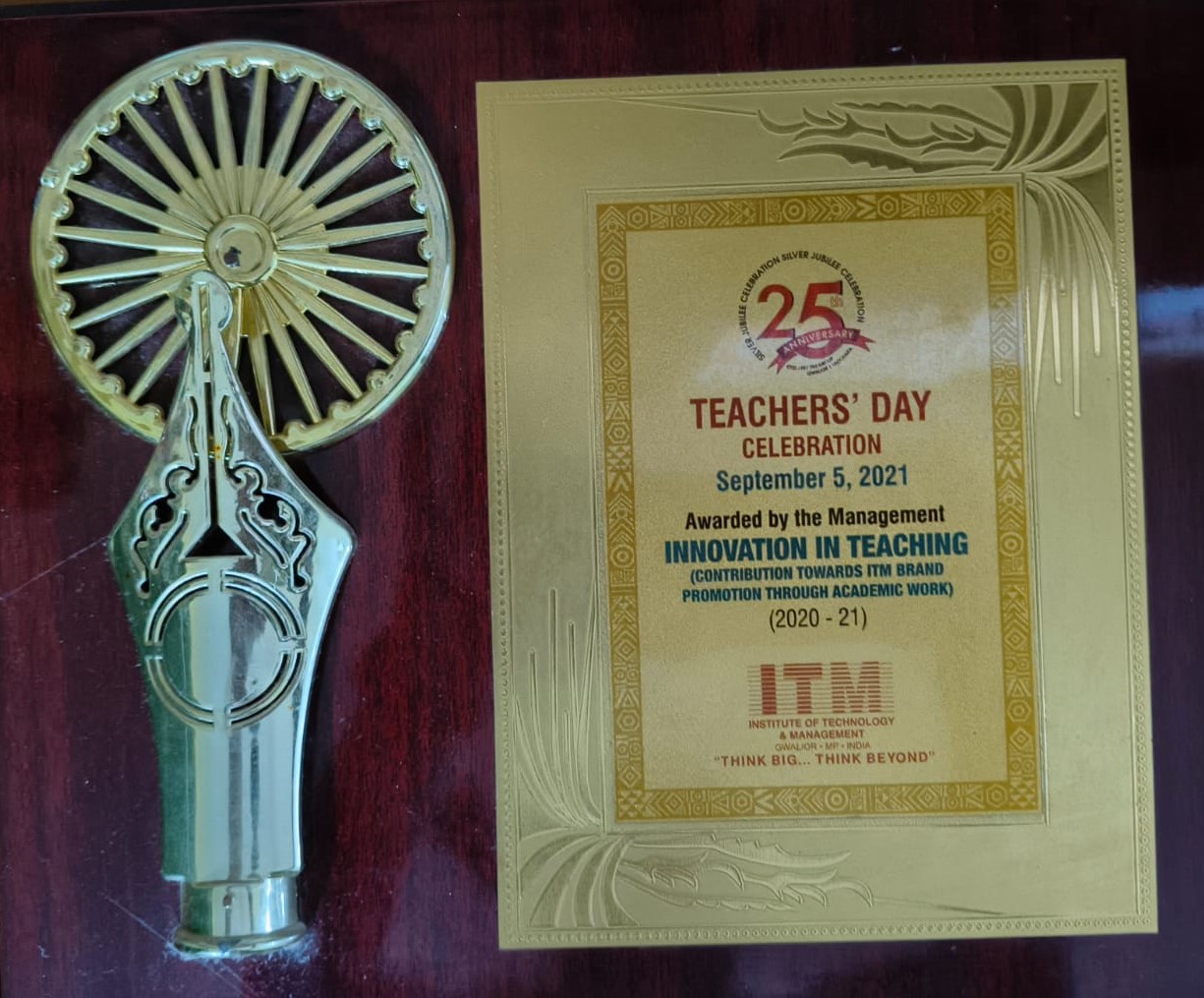
● Dr. Jitendra Singh Kushwah, Associate Professor ITM Sithouli Campus, honoured on Teachers Day (05th Sept 2021) for “Innovation in Teaching (Contribution Towards ITM Brand Promotion Through Academic Work)” of the year 2020-2021.
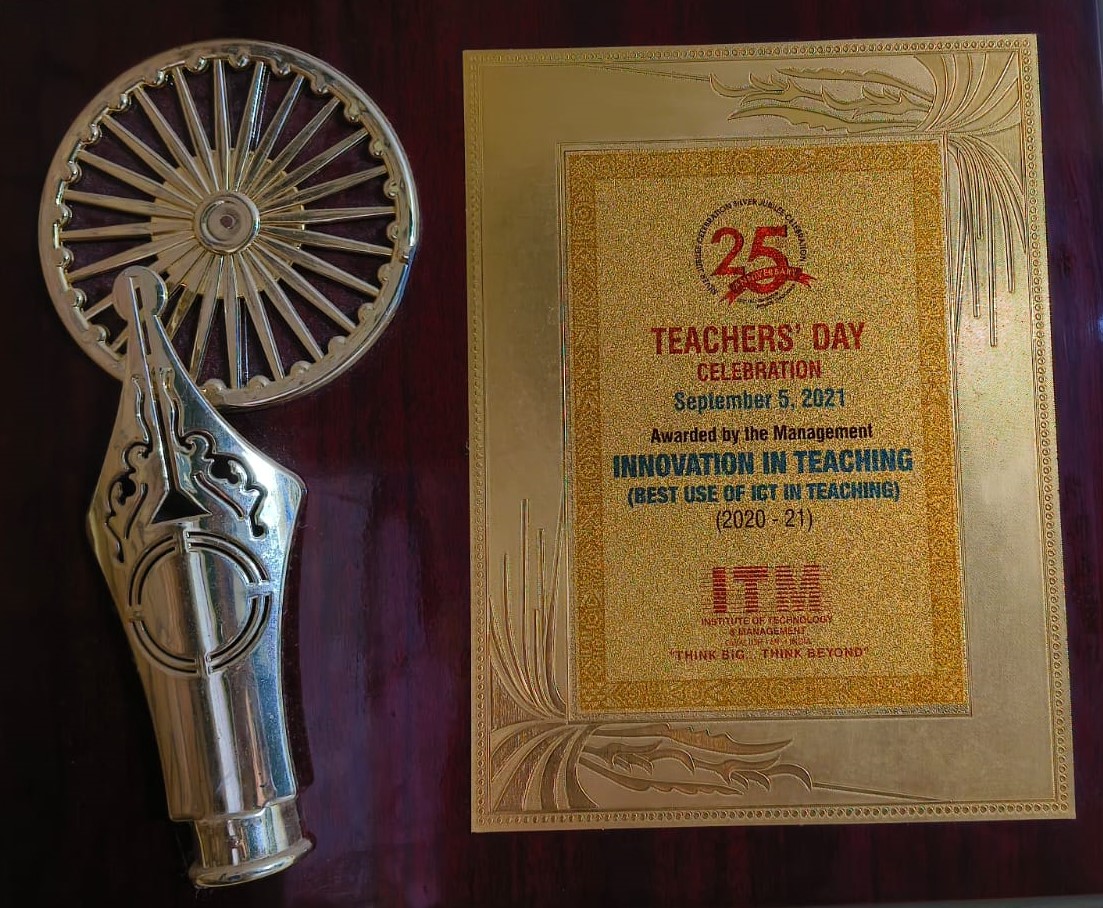
● Dr. Jitendra Singh Kushwah, Associate Professor ITM Sithouli Campus, honoured on Teachers Day (05th Sept 2021) for “Innovation in Teaching (Best use of ICT in Teaching)” of the year 2020-2021.
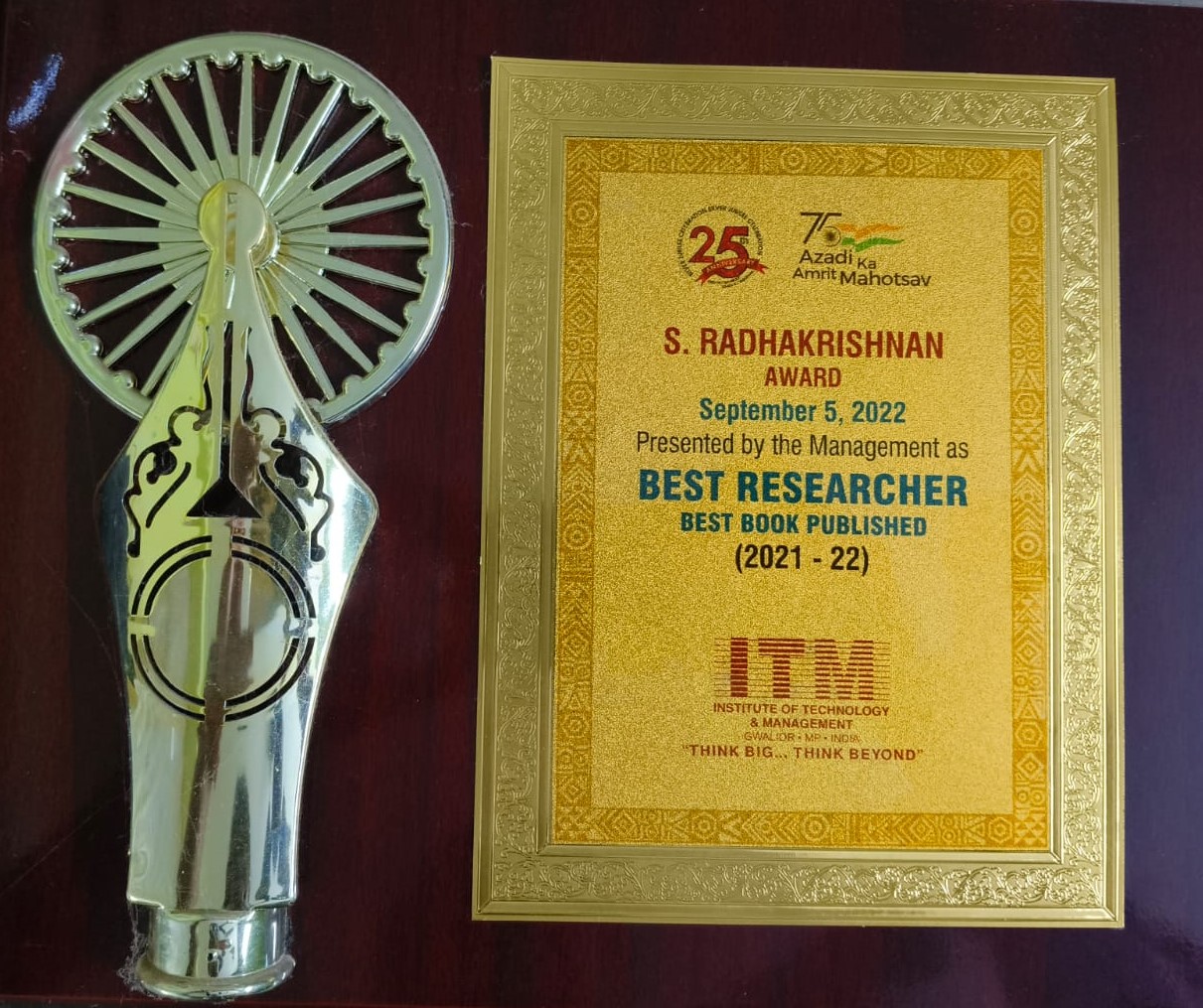
● Dr. Jitendra Singh Kushwah, Associate Professor ITM Sithouli Campus, honoured on Teachers Day (05th Sept 2022) for “Best Researcher (Best Book Published)” of the year 2021-2022.
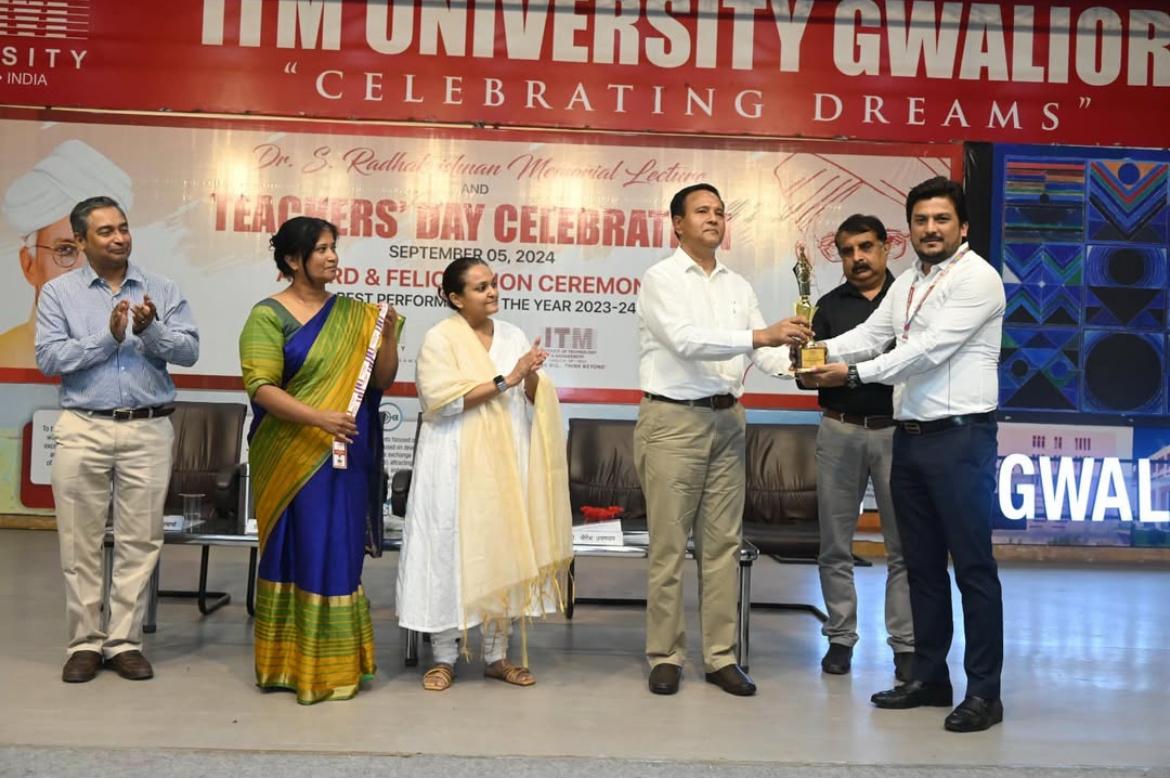
● Mr. Madhukar Dubey, Assistant Professor ITM Sithouli Campus, honoured on Teachers Day (05th Sept 2024) for “BEST TEACHER IN HANDLING TRAINING OF STUDENTS THROUGH TAP” of the year 2023-2024.
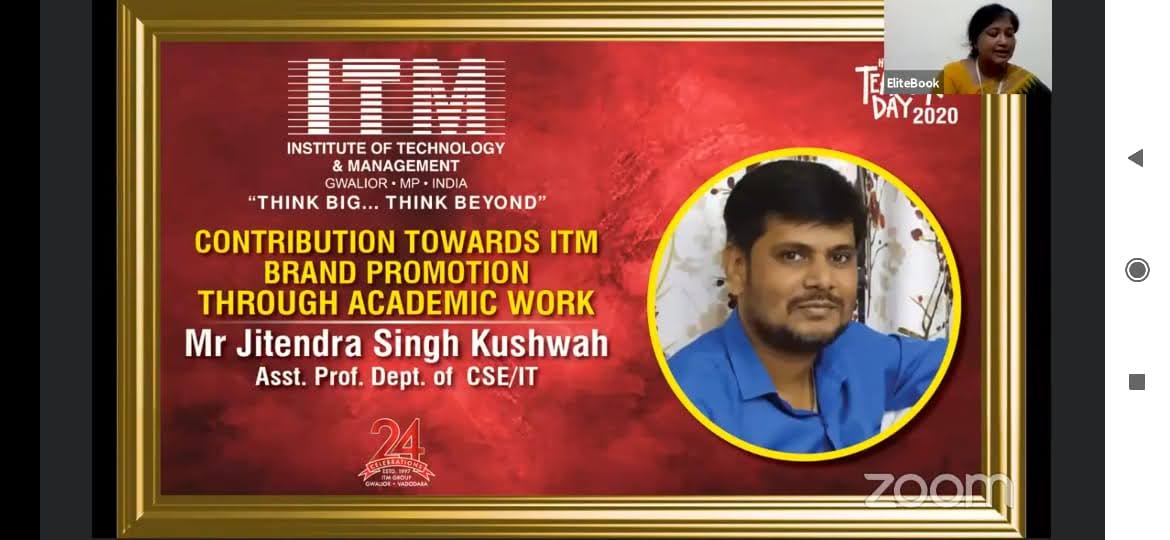
● Dr. Jitendra Singh Kushwah, Assistant Professor ITM Sithouli Campus, honoured on Teachers Day (05th Sept 2020) for “Innovation in Teaching (Contribution Towards ITM Brand Promotion Through Academic Work)” of the year 2019-2020.
Other Appreciations
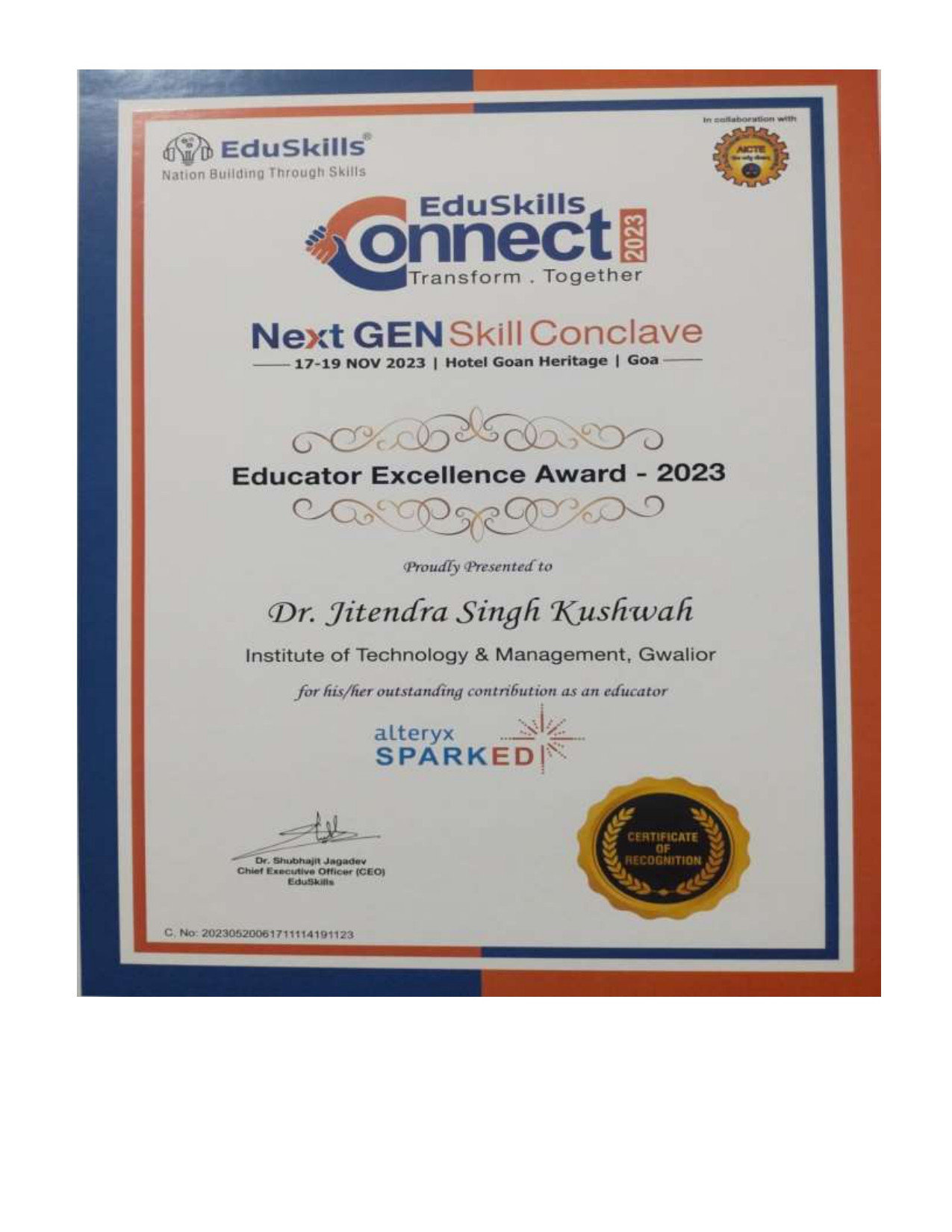
Alteryx Appreciation
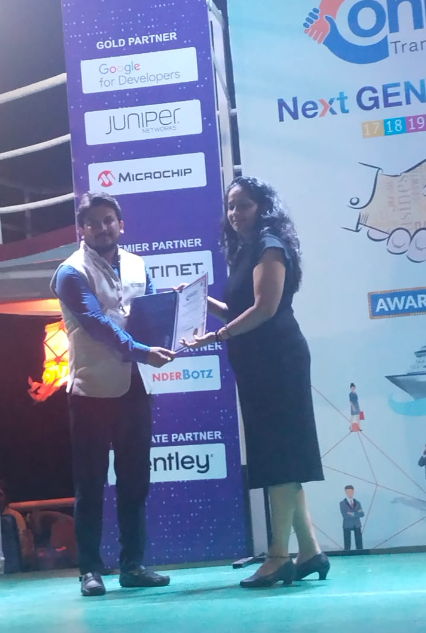
Award MD GOA
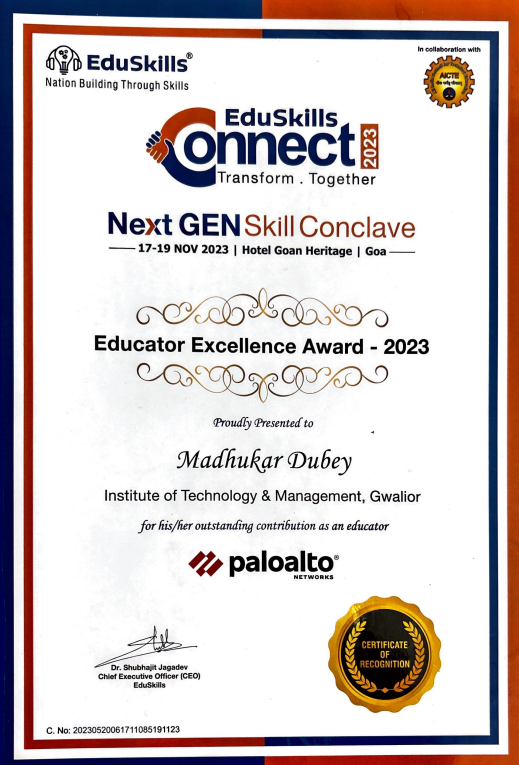
Educator Excellence Award
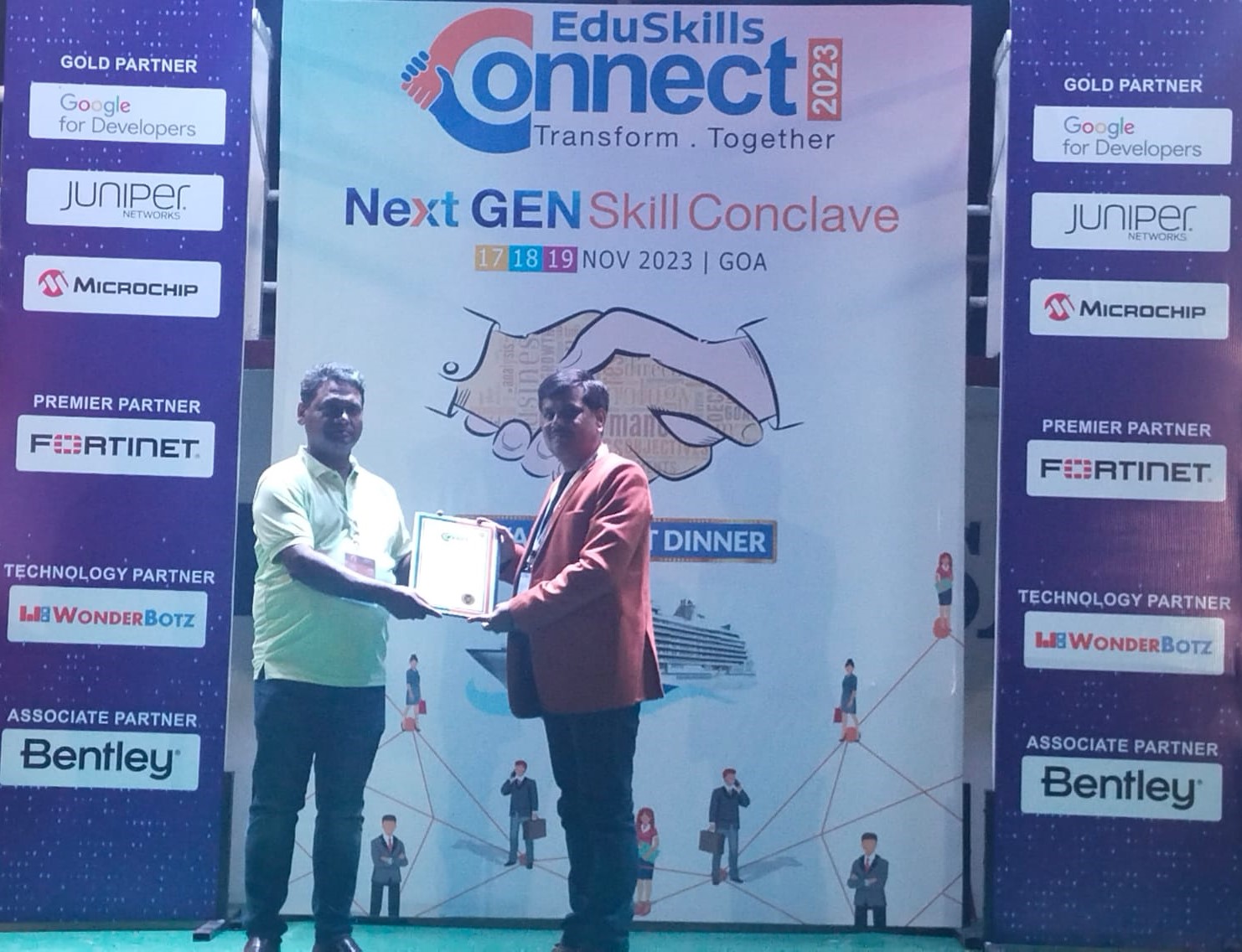
Eduskill Appreciation
Contact
Dr. Aditya Vidyarthi
Professor and Head
Department of Information Technology
+91 9300144689
hodit@itmgoi.in
Lab Manual
5th Sem
7th Sem
8th Sem
Academic Research
Journals – SCI/Scopus Indexed
- Verma, H., Vidyarthi, A., Chitre, A. V., Wanjale, K. H., Anusha, M., Majrashi, A., & Hinga, S. K. (2022). Local Binary Patterns Based on Neighbor‐Center Difference Image for Color Texture Classification with Machine Learning Techniques. Wireless Communications and Mobile Computing, 2022(1), 1191492.
- Amit Kumar Pandey, Dhyanendra Jain, Tarun Kumar Gautam, Jitendra Singh Kushwah, Saurabh Shrivastava, Rajeev Sharma, Prashant Vats, “Tomato Leaf Disease Detection using Generative Adversarial Network based ResNet50V2”, Engineering Letters, Vol. 32, No. 5, pp. 965-973, 2024.
- Jain D, Pandey A.K., Chauhan A.S., Kushwah J.S., Saxena N., Sharma R., Sambrow V.D. (2024). ASA-LSTM-based brain tumor segmentation and classification in MRI images. International Journal of Advanced Technology and Engineering Exploration, 11(115), 838–851. DOI: 10.19101/IJATEE.2023.10102143.
- Jitendra Singh Kushwah, Maitriben Harshadbhai Dave, Ankita Sharma, Keerti Shrivastava, Rajeev Sharma, Mohammad Nadeem Ahmed (2024). “AI-ENHANCED TRACKSEGNET: An Advanced Machine Learning Technique for Video Segmentation and Object Tracking.” ICTACT Journal on Image and Video Processing, Vol. 15, Issue 1, pp. 3384–3394, August 2024. ISSN: 0976-9102 (Online), 0976-9099 (Print). DOI: 10.21917/ijivp.2024.0480.
- Jitendra Singh Kushwah, Deepak Gupta, Anurag Shrivastava, P. Ambily Pramitha, John T. Abraham, Munindra Lunagaria (2022). “Analysis and Visualization of Proxy Caching Using LRU, AVL Tree and BST with Supervised Machine Learning.” Materials Today: Proceedings, Vol. 51, Part 1, pp. 750–755. ISSN: 2214-7853. https://doi.org/10.1016/j.matpr.2021.06.224.
- Jitendra Singh Kushwah, Atul Kumar, Subhash Patel, Rishi Soni, Amol Gawande, Shyam Gupta (2022). “Comparative Study of Regressor and Classifier with Decision Tree Using Modern Tools.” Materials Today: Proceedings, Vol. 56, Part 6, pp. 3571–3576. ISSN: 2214-7853. https://doi.org/10.1016/j.matpr.2021.11.635.
- Kushwah J.S., Jain D., Singh P., Pandey A.K., Das S., Vats P. (2022). “A Comprehensive System for Detecting Profound Tiredness for Automobile Drivers Using a CNN.” In: Shaw R.N., Das S., Piuri V., Bianchini M. (eds) Advanced Computing and Intelligent Technologies. Lecture Notes in Electrical Engineering, Vol. 914. Springer, Singapore. https://doi.org/10.1007/978-981-19-2980-9_33.
- Dr. Jitendra Singh Kushwah, Dr. Aditya Vidyarthi, Dr. Neeta Saxena, Dr. Ashutosh Sharma, Deepti Gupta, Ramnaresh Sharma (2022). “Technical Analysis and Visualization Approach to Stock Prices Using Long-Short-Term Memory.” Gongcheng Kexue Yu Jishu / Advanced Engineering Science, Vol. 54, Issue 02, pp. 5341–5352, Nov 2022. ISSN: 2096-3246. Journal ID: AES-30-11-2022-500.
- Shivanshu Ojha, Dr. Jitendra Singh Kushwah, Dr. Rishi Soni, Dr. Aditya Vidyarthi (2022). “Comparative Analysis of Linear Regression, Random Forest and Support Vector Machine Using Dataset.” International Journal for Innovative Engineering and Management Research, Vol. 11, Issue 1, pp. 30–35, Jan 2022. ISSN: 2456-5083. DOI: 10.48047/IJIEMR/V11/I01/05.
- Gupta, A., Gupta, D., Gupta, S., Pathak, A., Yadav, P., Kushwah, J. (2025). “An Improved Deep Neural-Based Approach for Classifying and Identifying Plant Diseases.” Journal of Environmental Informatics Letters, 13(1), 62–70. ISSN: 2663-6859 (Print), 2663-6867 (Online). DOI: 10.3808/jeil.202400151.
- Dubey, Aditya, Yadav, Pradeep, Bhargava, Chandra Prakash, Pathak, Trapti, Kumari, Jyoti, Shrivastava, Deshdeepak (2024). “Classification of Breast Cancer Histopathological Images Using Residual Learning-Based CNN.” KSII Transactions on Internet & Information Systems, Vol. 18, No. 12 (2024).
- Pradeep Yadav, Chandra Prakash Bhargava, Deepak Gupta, Jyoti Kumari, Archana Acharya, Madhukar Dubey (2024). “Breast Cancer Disease Prediction Using Random Forest Regression and Gradient Boosting Regression.” International Journal of Experimental Research and Review, 38, 132–146. DOI: https://doi.org/10.52756/ijerr.2024.v38.012.
Journals – Google Scholar Indexed
| 1. | Singh, Manali; Kushwah, Jitendra Singh; Rathore, Yogendra; Shrivastava, Kirti (2024). “The Study of Swarm Intelligence Technique: A Review.” Grenze International Journal of Engineering & Technology (GIJET), Vol. 10, Issue 2, Part 4, pp. 5143–5151, June 2024. ISSN: 2395-5287. Grenze ID: 01.GIJET.10.2.384. |
| 2. | Manali Singh, Dr. Jitendra Singh Kushwah, Dr. Aditya Vidyarthi (2024). “Energy-Efficient Technique to Provide Reliable Communication for Wireless Mobile Ad-hoc Networks.” ITM International Journal of Innovation in Science, Engineering, and Management (IIJISEM), Vol. 1, Issue 1, Published on 24 April 2024. ISSN: 2581-6020. |
| 3. | Acharya, Archana; Dubey, Madhukar; Kushwah, Jitendra Singh; Gaur, Neeraj; Tripathi, Pooja (2024). “A Comprehensive Overview of Sentiment Analysis Techniques.” Grenze International Journal of Engineering & Technology (GIJET), Vol. 10, Issue 2, Part 4, pp. 5514–5521, June 2024. ISSN: 2395-5287. Grenze ID: 01.GIJET.10.2.451. |
| 4. | Shrivastava, Saurabh; Sharma, Ramnaresh; Yadav, Pritaj; Kushwah, Jitendra Singh (2023). “Machine Learning Model for Agriculture Crop: A Review Study.” Grenze International Journal of Engineering & Technology (GIJET), Vol. 9, Issue 2, pp. 1270–1276. ISSN: 2395-5287. Grenze ID: 01.GIJET.9.2.387. |
| 5. | Gupta, Deepti; Vidyarthi, Aditya; Kushwah, Jitendra Singh (2023). “A Review of IoT Security, Requirements and Features.” Grenze International Journal of Engineering & Technology (GIJET), Vol. 9, Issue 1, pp. 2656–2659. ISSN: 2395-5287. Grenze ID: 01.GIJET.9.1.40. |
| 6. | Kushwah, Jitendra Singh; Tamrakar, Sitendra (2020). “Improve the Performance of Proxy Caching Using LRU, AVL Tree and BST.” STM Journal – Journal of Web Engineering & Technology, Vol. 7, Issue 1, pp. 13–20, April 2020. ISSN: 2455-1880. |
| 7. | Kushwah, Jitendra Singh; Tamrakar, Sitendra (2018). “Caching Proposal Based on Least Recently Used Algorithm and AVL Tree.” Journal of Software Engineering Tools & Technology Trends (JoSETTT), Vol. 5, Issue 2, pp. 37–47. ISSN: 2394-7292 (Online). |
| 8. | Kushwah, Jitendra Singh; Chaturvedi, Abhishek; Sharma, Parul (2014). “Software Project Management: A Synchronization Between People, Process, Product, and Project.” International Journal of Emerging Trends & Technology in Computer Science (IJETTCS), Vol. 3, Issue 5, pp. 122–125, Sept–Oct 2014. ISSN: 2278-6856. [Impact Factor: 2.524 (2013), 3.258 (2014)]. |
| 9. | Joshi, M.N.; Soni, R.; Kushwah, J.S. (2019). “Adaptive Machine Learning Models for Dynamic IoT Environments.” Journal of Internet of Things: Principles and Applications in Computer Science, February 2019, p. 118. |
| 10. | Goyal, Vansh; Garg, Suryansh; Vidyarthi, Aditya; Gupta, Ashish; Kushwah, Jitendra Singh (2025). “Online Shopping System Using Java Programming Language.” International Journal of Advanced Research in Science, Communication and Technology (IJARSCT), Vol. 5, Issue 8, pp. 572–577, March 2025. ISSN: 2581-9429. DOI: 10.48175/IJARSCT-2457. |
| 11. | Gupta, Chiti; Vidyarthi, Aditya; Kushwah, Jitendra Singh; Gupta, Ashish (2025). “Detection of DDoS Attack Using Machine Learning: A Review.” International Journal of Advanced Research in Science, Communication and Technology (IJARSCT), Vol. 5, Issue 2, pp. 552–559, April 2025. ISSN: 2581-9429. DOI: 10.48175/IJARSCT-24969. |
| 12. | Kushwah, Jitendra Singh; Tamrakar, Sitendra (2018). “An Extensive Review of Web Caching Techniques to Reduce Cache Pollution.” Anusandhan [AUJ-AN], Vol. 6, Issue 13, pp. 87–95, March 2018. ISSN: 2278-4187. |
| 13. | Kushwah, Jitendra Singh; Soni, Rishi; Vidyarthi, Aditya; Ojha, Shivanshu (2022). “Comparative Analysis of Linear Regression, Random Forest and Support Vector Machine Using Dataset.” International Journal for Innovative Engineering and Management Research (IJIEMR), Vol. 11, Issue 1, pp. 30–35, Jan 2022. ISSN: 2456-5083. |
| 14. | Shrivastava, Deshdeepak (2023). “Evolutionary Algorithm-Based Pareto Front Exploration for Efficient Cost-Performance Tradeoffs in Big Data Analytics.” ICTACT Journal on Soft Computing, Vol. 13, Issue 4, July 2023. ISSN: 2229-6956 (Online). DOI: 10.21917/ijsc.2023.0425. |
| 15. | Srivastava, Deshdeepak (2024). “Classification of Breast Cancer Histopathological Images Using Residual Learning-Based CNN.” KSII Transactions on Internet and Information Systems, Vol. 18, No. 12, Dec 2024. |
| 16. | Rajput, Priyanka; Dubey, Madhukar (2017). “Grid Based Sensor Node Deployment Approach for Localization in WSN.” International Journal of Advanced Science and Technology, Vol. 104, pp. 21–32. DOI. |
| 17. | Shrivastava, Saurabh; Dubey, Gaurav (2022). “A New Technique for Wireless Sensor Network Intrusion Prevention Using Dense Artificial Neural Networks.” International Journal for Research in Applied Science & Engineering Technology (IJRASET), Vol. 10, Issue 7, July 2022. ISSN: 2321-9653. IC Value: 45.98; SJ Impact Factor: 7.538. |
| 18. | Shrivastava, Saurabh; Dubey, Gaurav (2022). “A Survey on Intrusion Detection Systems Predicated Using Single, Hybrid, and Ensemble Classifiers.” International Journal of Research and Analytical Reviews (IJRAR), Vol. 9, Issue 3, July 2022. E-ISSN: 2348-1269. P-ISSN: 2349-5138. |
| 19. | Gupta, Deepak; Sharma, Ankita; Pandey, Rashmi; Shrivastava, Deshdeepak; Acharya, Archana; Dubey, Madhukar (2024). “Enhancing Collaborative Mitigation of Volumetric DDoS Attacks and Failures in Multi-SDN Networks.” ICTACT Journal on Communication Technology, Vol. 15, No. 2, 2024. |
| 20. | Deshpande, Apoorva; Sharma, Ramnaresh (2018). “Multilevel Ensemble Classifier Using Normalized Feature-Based Intrusion Detection System.” International Journal of Advanced Trends in Computer Science and Engineering, Vol. 7, Issue 5, pp. 72–76, 2018. |
| 21. | Deshpande, Apoorva; Sharma, Ramnaresh (2018). “Anomaly Detection Using Optimized Features with Genetic Algorithm and Multi-Ensemble Classifier.” Smart Moves Journal IJOSTHE, Vol. 5, Issue 6, pp. 7–7, 2018. |
| 22. | Jitendra Singh Kushwah, Dr. SitendraTamrakar, (2018). “Caching Proposal Based on Least Recently Used Algorithm and AVL Tree” Journal of Software Engineering Tools & Technology Trends(JoSETTT)ISSN: 2394-7292 (Online), Volume 5, Issue 2, pp. 37-47,2018 |
Conferences / Proceedings Publications (Google Scholar/Scopus)
| 1. | Pandey, D., Vidyarthi, A., Kushwah, J.S. (2023). Internet of Things-Based Smart Irrigation System for Moisture in the Soil and Weather Forecast. In: Tomar, R.S., et al. Communication, Networks and Computing. CNC 2022. Communications in Computer and Information Science, vol 1894. Springer, Cham. https://doi.org/10.1007/978-3-031-43145-6_9. |
| 2. | Singhai, S., Gautam, P., Kushwah, J.S., Gupta, S.K. (2023). Analysis and Comparison of Posture Detection Using Deep Learning Algorithm. In: Tomar, R.S., et al. Communication, Networks and Computing. CNC 2022. Communications in Computer and Information Science, vol 1893. Springer, Cham. https://doi.org/10.1007/978-3-031-43140-1_3. |
| 3. | Shrivastava, S., Sharma, R., Yadav, P., Kushwah, J.S., “Machine Learning Model for Agriculture Crop: A Review Study” in 14th International Conference on Advances in Computing, Control, and Telecommunication Technologies, ACT 2023, pp. 1270–1276, 2023-June, Code 192282. |
| 4. | Shrivastava, S., Kushwah, J.S., Vidyarthi, A., “Comparative Analysis of Parameters using Regression Supervised Machine Learning on Dataset” in 14th International Conference on Advances in Computing, Control, and Telecommunication Technologies, ACT 2023, pp. 2691–2698, Code 192282. |
| 5. | Singh, M., Kushwah, J.S., Rathore, Y., Shrivastava, K., “The Study of Swarm Intelligence Technique: A Review” in 15th International Conference on Advances in Computing, Control, and Telecommunication Technologies, ACT 2024, Volume 2, pp. 5143–5151, 2024, ISBN: 979-833130057-9, Code 203500. |
| 6. | Gupta, D., Vidyarthi, A., Kushwah, J.S., “A Review of IoT Security, Requirements and Features” in 14th International Conference on Advances in Computing, Control, and Telecommunication Technologies, ACT 2023, pp. 2656–2659, 2023-June. |
| 7. | Acharya, A., Dubey, M., Kushwah, J.S., Gaur, N., Tripathi, P., “A Comprehensive Overview of Sentiment Analysis Techniques” in 15th International Conference on Advances in Computing, Control, and Telecommunication Technologies, ACT 2024, pp. 5514–5521, 2024. |
| 8. | Madhukar Dubey, Dr. Rajni Ranjan Sing Makwana, “Enhancing Web Security: Hybrid Deep Learning Model for Robust URL Phishing Detection” accepted in 2nd IEEE International Conference on Interdisciplinary Approaches in Technology and Management for Social Innovation (IATMSI-2024) organized by IEEE MP Section and ABV-IIITM, Gwalior dated 14–16 March 2024. |
| 9. | Monika Dandotiya and Madhukar Dubey, "A VGG-16 Framework for An Efficient Indoor-Outdoor Scene Classification", In: Raju Pal and Praveen Kumar Shukla (eds), SCRS Conference Proceedings on Intelligent Systems, SCRS, India, 2022, pp. 321–330. https://doi.org/10.52458/978-93-91842-08-6-32. |
| 10. | Archana Acharya, Harshita Sharma, Aisha Dhakre, Nitesh K Rathore, Satyam Agarwal, “Enhance Performance of Data using Visualization Tool: A Systematic Review” in 6th International Conference on Artificial Intelligence & Robotics in Life Science (ICAR-2024) dated 22–23 November 2024. |
| 11. | Rishabh Shukla, Archana Acharya, Madhukar Dubey, Ayushman Johri, Samrat Chopra, “An Ensemble Learning Method for Credit Card Data Anomaly Detection” in 3rd International Student Conference on Multidisciplinary and Current Technical Research (ISCMCTR - 2025), MITS, Gwalior, 29–30 March 2025. |
| 12. | Archana Acharya, “Sarcasm Detection in Code-Mixed Text Using Deep Learning Techniques” in International Conference on Futuristic Aspects in Science & Engineering (ICFAiSE-2025) held at ICFAI University, Jaipur, 6–7 Feb 2025. |
| 13. | Khushboo Saraswat, Aditya Vidyarthi, Deshdeepak Shrivastava, Saurabh Shrivastava, “A Compendium to Machine Learning for Biologists” in Second International Conference on Advances in Information, Telecommunication and Computing (AITC-2024), 27–28 April 2024. |
| 14. | A. Dubey, N. Dixit, R. Arora, J. Mishra, D. D. Shrivastava, S. Kinger, "Challenges and Opportunities in Digital Image Watermarking," 2024 First International Conference on Pioneering Developments in Computer Science & Digital Technologies (IC2SDT), Delhi, India, 2024, pp. 29–34, doi:10.1109/IC2SDT62152.2024.10696394. |
| 15. | Aditya Vidyarthi, Pooja Rao, Vinod Kumar Yadav, “An Approach to Find Nearest Location Services through Skyline Query & KNN” in Conference SCI-2K19. |
| 16. | Veerendra Ku. Patel, Vinod Kumar Yadav, Dr. Aditya Vidyarthi, “Image Classification using Supervised Learning based on SVM-SIFT” in INTERNATIONAL JOURNAL OF INFORMATION AND COMPUTING SCIENCE, ISSN NO: 0972-1347, 5(6):125–132, June 2018. |
